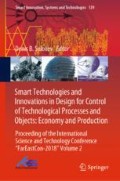Abstract
This article explores the problem of introducing score and rating system for assessment of students’ progress to the education process in the higher education institutions of the engineering realm of study. The authors analyze the experience of score and rating system implementation based on the Far Eastern Federal University. The authors have built profiles of respondents and carried out analysis of perception and viability of score and rating system.
Access this chapter
Tax calculation will be finalised at checkout
Purchases are for personal use only
References
Holmes, N.: Engaging with assessment: Increasing student engagement through continuous assessment. Act. Learn. High Educ. 19(1), 23–34 (2018)
Cheung-Blunden, V., Khan, S.R.: A modified peer rating system to recognise rating skill as a learning outcome. Assess. Eval. High. Educ. 43(1), 58–67 (2018)
Peart, D.J., Rumbold, P.L.S., Keane, K.M., et al.: Student use and perception of technology enhanced learning in a mass lecture knowledge-rich domain first year undergraduate module. Int. J. Educ. Technol. High. Educ. 14, 40 (2017). https://doi.org/10.1186/s41239-017-0078-6
Pollio, M., Hochbein, C.: The association between standards-based grading and standardized test scores as an element of a high school reform model. Teachers Coll. Rec. 117(11), 110302 (2015). WOS:000216116800002
Ballou, D., Springer, M.G.: Using student test scores to measure teacher performance: some problems in the design and implementation of evaluation systems. Educ. Res. 44(2), 77–86 (2015). SI
Arzhanik, M.B., Vorobyeva, N.V., Ostrikova, O.I., et al.: Rating system for the knowledge and skills control and its realization in the learning environment “Moodle”. Byulleten Sibirskoy Meditsiny 14(1), 120–125 (2015)
Regulations on the rating system for assessing the progress of students in higher education educational programs of the FEFU, approved by the order of the rector of the Far Eastern Federal University No. 12-13-1718 of October 28 (2014). https://www.dvfu.ru/admission/secondary-vocational-education/branch_of_far_eastern_federal_university_in_the_city_of_dalnegorsk/information-about-educational-organization/docs/Polozenie_reiting_sist_28.10.2014.pdf. Accessed 14 Jan 2018 (in Russian)
Zuniga-Vicente, J.A., Forcadell-Martinez, F.J., Medina-Salgado, S. et al.: The implementation of the Bologna process and academic outcomes: an exploratory study at Rey Juan Carlos university. In: 9th International Technology, Education and Development Conference (INTED), Madrid, pp. 5130–5137 (2015)
Parlak, B., Dogan, N.: Comparison of answer key and scoring rubric for the evaluation of the student performances. Hacettepe Universitesi Egitim Fakultesi Dergisi-Hacettepe Univ. J. Educ. 29(2), 189–197 (2014)
Yuste-Delgado, A.J., Cuevas-Martinez, J.C., Canada-Bago, J. et al.: Assesment evaluation of pre-Bologna degrees and post-Bologna degrees. In: 7th International Conference of Education, Research and Innovation (ICERI), Seville, pp. 6102–6105 (2014)
Chen, H.-J., She, J.-L., Chou, C.-C., et al.: Development and application of a scoring rubric for evaluating students’ experimental skills in organic chemistry: an instructional guide for teaching assistants. J. Chem. Educ. 90(10), 1296–1302 (2013)
Wothke, W., Burket, G., Chen, L.-S.: Multimodal likelihoods in educational assessment: will the real maximum likelihood score please stand up? J. Educ. Behav. Stat. 36(6), 736–754 (2011)
Sazonova, Z.S., Ippolitova, G.K.: The point-rating system for the assessment of the quality of students’ education. In: 15th International Conference on Interactive Collaborative Learning (ICL), Villach, WOS: 000335746300057 (2012)
Nieto-Fernandez, F.E., Quarless, D.A., Roccanova, P.: An online hybrid model coupled to a developmental scoring rubric for the assessment of student progress in a research abroad program. In: 8th International Technology, Education and Development Conference (INTED), Valencia, pp. 4294–4299 (2014)
Garcia Soidan, P.: A scoring scale to measure the student’s performance on a practical statistical task. In: 4th International Technology, Education and Development Conference (INTED), Valencia, pp. 1416–1418 (2010)
Ubeda, D., Gil, A., Paya, L. et al.: Experiences in the students’ assesment in a computer science applied to engineering subject. In: 4th International Technology, Education and Development Conference (INTED), Valencia, pp. 228–233 (2010)
Zenisky, A.L., Hambleton, R.K., Sireci, S.G.: Getting the message out: an evaluation of NAEP score reporting practices with implications for disseminating test results. Appl. Measur. Educ. 22(4), 359–375 (2009)
Kurt, A.A., Izmirli, S.: The views of teacher candidates about the use of a scoring rubric for the evaluation of their products in the course of instructional technologies and material development. In: World Conference on Educational Sciences, Nicosia, pp. 988–992 (2009)
Kan, A.: An alternative method in the new educational program from the point of performance-based assessment: rubric scoring scales. Kuramve Uygulamada Egitim Bilimleri 7(1), 129–152 (2007)
Musa, R., Saidon, J.: New insights to the national HEIs rating system: exploring the attributes of Student Experiential and Engagement Value Index (SEEVI). In: 6th International Conference on University Learning and Teaching (INCULT), pp. 660–669. Ohio, Ohio University, Shah Alam (2012)
Chye, E.U., Levenets, A.V., Solovev, D.B.: Hardware support of the periodic component detection algorithm based on zero-crossing. In: 2018 International Multi-Conference on Industrial Engineering and Modern Technologies (FarEastCon), pp. 1–5 (2018). http://dx.doi.org/10.1109/FarEastCon.2018.8602639
Author information
Authors and Affiliations
Corresponding author
Editor information
Editors and Affiliations
Rights and permissions
Copyright information
© 2019 Springer Nature Switzerland AG
About this paper
Cite this paper
Shkarina, T., Chudnova, O., Repina, I., Solovev, D. (2019). Challenges of Implementing Rating System for Knowledge Assessment at the Russian Higher Education Institutions. In: Solovev, D. (eds) Smart Technologies and Innovations in Design for Control of Technological Processes and Objects: Economy and Production. FarEastСon 2018. Smart Innovation, Systems and Technologies, vol 139. Springer, Cham. https://doi.org/10.1007/978-3-030-18553-4_1
Download citation
DOI: https://doi.org/10.1007/978-3-030-18553-4_1
Published:
Publisher Name: Springer, Cham
Print ISBN: 978-3-030-18552-7
Online ISBN: 978-3-030-18553-4
eBook Packages: Intelligent Technologies and RoboticsIntelligent Technologies and Robotics (R0)

